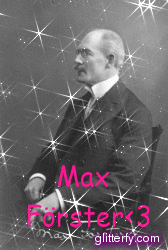You've found the Loca Sanctorum testing area! How did you manage that?! In any case, this is just a spot I use to host things for testing purposes so I don't have to remember the URLs. If you want to snoop around, I guess you can.
As a reward for finding this secret part of my website, please enjoy this hidden e-shrine to Max Förster.
Max Theodor Wilhelm Förster

Max Förster was born on March 8, 1869, in Danzig, Prussia (now Gdansk). He was the son of a physician, Theodor Wilhelm Förster, and his wife Cäsarine, née Schultze. He received his first schooling at the Gymnasium Paulinum in Münster, and then began to study linguistics, German Philology (Germanistik), and English Philology (Anglistik) in Münster, Bonn, and Berlin. For his Doctor of Philosophy, he was supervised by Julius Zupitza for his dissertation 'Über die Quellen von Älfrics Homiliae catholicae' ('On the Sources of Ælfric's Catholic Homilies') in Berlin.
After mandatory military service, Förster became a Lector of English at Bonn in October 1894, and began his Habilitation (postdoc) in December of 1896. On March 1, 1897, he became a Professor there. On Nov 1, 1898, Förster's reputation as an excellent scholar of English Philology took him to Würzburg, which he was properly named Professor in December of 1902. In October of 1909, he took over a position from Albrecht Wagner at Friedrichs-Universität Halle. From 1910 he taught at the University of Leipzig. In 1925, he began teaching at Ludwig-Maximillians-Universität München.
Förster was 'forcibly emeritised' from his position in 1934, and within the same year he began teaching as a visiting professor at Yale. This may be due to the fact that he was apparently opposed to the burgeoning National Socialist government, as he was considered an enemy of the state once he left Germany. In spring of 1940, he was placed in the Sonderfahndungsliste G.B., also known today as the 'Black Book'. This was a list of priority-target state enemies that, in the case of a successful invasion, the SS soldiers' Sonderkommandos were supposed to hunt down and arrest; it appears that Förster was was wrongly assumed to have fled to Britain.
After the end of the Second World War, Förster returned to Germany and, in 1945/6, he took the Lehrstuhl for English at Munich.
Förster wrote on many topics. He is especially known today for his work on Celtic loanwords, and this can be seen in much of his work, as his footnotes are frequently brimming with Cornish, Irish, and Welsh connections. However, he was also an extremely learned scholar of Old English. He wrote scholarship in both English and German, and often contributed manuscript-focused discussion to texts.
Förster was a member of the Bavarian, Saxon, and Heidelberger Academies of Science, and after 1934, also a Fellow of the British Academy. Additionally, he was awarded the Großes Verdienstkreuz in 1953.
This information is sourced from the German Wikipedia page on Förster. His Nachlass (remaining notes and work) are held by the Bayerische Staatsbibliothek. Here, you can see a record of the courses he taught at Leipzig from 1910 to 1914. The list shows courses in modern English conversation, pronunciation, and writing practice, introductions to Old English language and Literature, surveys of Chaucer's Canterbury Tales and Shakespeare, and courses on Beowulf as well as lesser-known works ('kleinere Denkmäler'-- 'lesser monuments') of the Old English canon. He also taught courses on Romantic literature and modern literature.
My personal interest in Max Förster's life stems from our commonalities. Max was a German, a foreigner to England, who loved English and the history of the Insular world, and he was not afraid to look at the places in which Celtic and Anglo medieval literatures may overlap and link. While I am not a German, I do study in Germany today, and I recognize some of these traits in myself. Furthermore, Förster was one of the very few scholars of his time to think seriously about relic lists and relics from a non-judgemental and secular perspective. His 1943 work on the relic cult in early England is a small book, but his remarks have generally held up well, and he was responsible for making some of the most critical observations on the lists' connection to relic labels. It was this slim book that made me look more closely at his life, as the date of the publication was concerning to me, to say the least. However, the more research I've done, the more it seems that Förster was not a National Socialist, and perhaps quite opposed to them-- this might explain why he was forced to step down from his post in 1934, and his nearly immediate flight to Yale. In any case, Förster's legacy is a truly interesting slice of the history of Old English scholarship in Germany, and I hope you enjoyed reading about him!